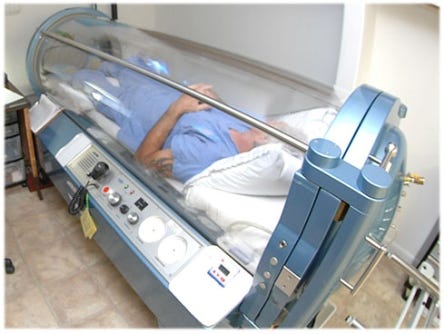
Years after going through intensive recovery from losing both legs and part of his hand in a blast from a roadside bomb in Iraq, Army Sgt. Joshua Cope was still struggling.
In 2011, five years after the explosion that wounded him and killed two others, Cope had very little short-term memory. He hardly spoke, was depressed and quick to anger. He couldn’t sleep. He was frustrated with his condition and always was on edge.
The explosion also gave Cope a severe concussion, and years later he still was grappling with the effects it had on his brain as well as lingering post-traumatic stress.
He and his family were at wits’ end.
Cope heard of a type of therapy, hyperbaric oxygen, that provided relief for other soldiers who had been injured in bombings or blasts.
The treatment wasn’t covered by his veterans benefits, but a local doctor, Eddie Zant, was donating his services to people who were wounded in the military.
Cope underwent the therapy, and it worked.
“I’m a totally different person,” he said recently from near his home in Orlando where he was playing outside with his three young children. “I was just so thankful that he was willing to do it.”
Over the past several years, Zant, a retired Army medic who served during Vietnam, has given hyperbaric treatments to about 50 Iraq and Afghanistan veterans from across the country.
He said it has cost him about $170,000 out-of-pocket for the liquid oxygen alone, not counting labor and rent costs, but it works and he wants to help.
“These are great people,” Zant said. “I enjoy working with them and seeing them get better.”
More and more veterans have been returning home from war zones with severe concussions from roadside bombs and rocket-propelled grenades, Zant said.
“I could spend the rest of my life treating military men and women,” he said.
He said there are an estimated 350,000 people in the military who are suffering from severe concussions or post-traumatic stress.
Many search in vain for treatment that will help.
The Army and the Veterans Affairs don’t pay for hyperbaric oxygen treatment, but Zant said he hopes that will change soon.
Zant has neuropsychological tests in place to track patients’ progress. He’s compiled research reports and taken his findings to Congress to try to get coverage for the treatment.
“It’s not guesswork,” he said. “They get better.”
After a severe concussion, neurons in the brain are damaged and don’t connect properly. The oxygen therapy helps the brain generate new cells that can bring the neurons back to a functional level.
Okaloosa County Judge Patt Maney, a brigadier general in the Army Reserve, was wounded when an improvised bomb exploded under his Toyota Land Cruiser in Afghanistan in 2005.
A year after recovering from the injuries to his body, Maney’s wife Caroline still had to help him get around. He couldn’t remember what he was trying to do long enough to complete a task.
He couldn’t find words to finish simple sentences. By the time he got to the end of a sentence he was reading, he’d forgotten what it said at the beginning. He couldn’t follow television shows or balance his checkbook. He couldn’t sleep.
“I could walk and talk but I wasn’t functioning,” Maney said.
His body was healing but his brain injuries were not.
He couldn’t continue to perform his Army duties, and there was no way he could return to the court bench.
Zant, a friend of his, recommended the hyperbaric oxygen therapy.
“It totally saved my way of life. My quality of life has been restored because of him,” Maney said.
Maney returned to the bench in June 2007, and has recommended the treatment at Zant’s clinics in Destin and Fort Walton Beach to many veterans.
“Every wounded warrior that I have encouraged to go there had improvement. Every single one,” Maney said.
He said he believes it is a “professional scandal” that the military and Veterans Affairs are not adequately treating brain injuries.
Cope and Maney have advocated for the DoD and VA to consider the treatment.
For now, Zant remains one of a handful of doctors across the country who offer the service for wounded warriors.
“I honestly think he’s a hero both as a professional and for the community,” Maney said.
TO LEARN MORE: Read more about the treatment and Dr. Eddie Zant’s clinic at www.flhbot.com.
Contact Daily News Staff Writer Lauren Sage Reinlie at 850-315-4440 or lreinlie@nwfdailynews.com. Follow her on Twitter @LaurenRnwfdn.
This article originally appeared on Crestview News Bulletin: Local doctor donates treatments to wounded troops
